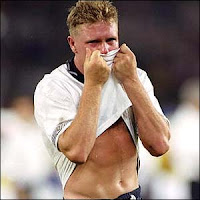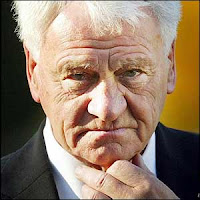 According to this wobbly tear-jerker of a documentary, the moment when Paul Gascoigne burst into tears in 1990's World Cup changed the nature of English football forever. No, really – forever.
According to this wobbly tear-jerker of a documentary, the moment when Paul Gascoigne burst into tears in 1990's World Cup changed the nature of English football forever. No, really – forever.Just look at that title; football changed. Overnight. Completely. Forever. Which you'd think this documentary would then go on to prove. You could be forgiven for expecting an hour's program that tells its viewers about a) the state of English football before that infamous match (England vs. West Germany, World Cup semi-final, 1990, if you're interested), b) the state of English football after that match (when Gazza's tears had changed it) and c) exactly how the aforementioned tears changed anything.
That isn't what happens. Instead, viewers are presented with a lengthy description of England's campaign in 1990's World Cup – one that doesn't stint on emotional intensity, patriotic optimism, talking heads and assumptions that its audience knows how the campaign ended. There's a certain air of nostalgia to all this; those that remember Italia '90, before English football became a multi-million pound business, get a glimpse of the good old days. Days when England's team were more interested in drinking than playing, when a defeat resulted in the team and manager being savaged by the press, and the fans were almost synonymous with hooligans...actually, not that much different from today. In fact, the rash optimism (phrases like 'we can go all the way') of fans has been echoed – despite England's poor performances against the USA, Algeria and Slovenia – in the 2010 World Cup. So, twenty years later the sense of disappointment felt when the team crashes out (despite this being fairly predictable from the start) is still present. What exactly did Gazza change when he cried in the semi-final against West Germany?
It's a question this documentary resolutely fails to answer. In fact, it poses the question in its title, then promptly ignores it. Its interest lies in reminding viewers about how close England came back in 1990. The film-makers aren't afraid to over-egg the pudding (but then that's often the problem with England's national side); with West Germany victorious (4-3 on penalties), England fans felt 'grief', apparently...they were disappointed, yes, fair enough, but to compare it to a death in the family seems a bit strong. Worse is when one former player laments how close England came to winning the Cup...then corrects himself when he remembers that they were only playing for a place in the final. It's not the same thing as winning the tournament; there's another 90 minutes (at least) after that.
Once viewers have been walked down the familiar path to defeat (and the tour bus that
 greeted the defeated team in England), this documentary almost goes back to its opening section – which was a cursory nod to the modern nature of English football, all glamour, big spending and high ticket prices. But no. Instead, some more emotional overkill, wheeling out Sir Bobby to watch a match played as a tribute to him and his long career just before he lost his battle with cancer. Touching as it all is, and undoubtedly genuine as more tears from Gazza are, it tells viewers nothing about the new nature of English football, or how that may have changed since 1990. The film merely asserts that such a change has taken place. Repeating a fact does not make it more true.
greeted the defeated team in England), this documentary almost goes back to its opening section – which was a cursory nod to the modern nature of English football, all glamour, big spending and high ticket prices. But no. Instead, some more emotional overkill, wheeling out Sir Bobby to watch a match played as a tribute to him and his long career just before he lost his battle with cancer. Touching as it all is, and undoubtedly genuine as more tears from Gazza are, it tells viewers nothing about the new nature of English football, or how that may have changed since 1990. The film merely asserts that such a change has taken place. Repeating a fact does not make it more true.Is it so much to ask that ITV documentaries have some facts, or even some investigation, to back up their statements? Or that those documentaries have titles that reflect their content? Sure, the title grabs attention, makes it sound like the film examines a turning-point in sporting history...but that's not true. It's an examination (and an emotional, subjective one at that) of Bobby Robson's 1990 World Cup and later tribute. So why not call it that?
The show may still be available to view on ITVPlayer here.
No comments:
Post a Comment